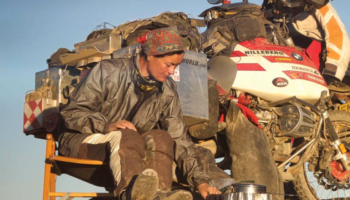“This article is published with the permission of RoadRUNNER Motorcycle Touring & Travel Magazine. It is not for sale or redistribution. RoadRUNNER is a bimonthly motorcycle touring magazine packed with exciting travel articles, splendid photography, maps and GPS files. Subscriptions are available online (www.roadrunner.travel), or by calling (866) 343-7623.”
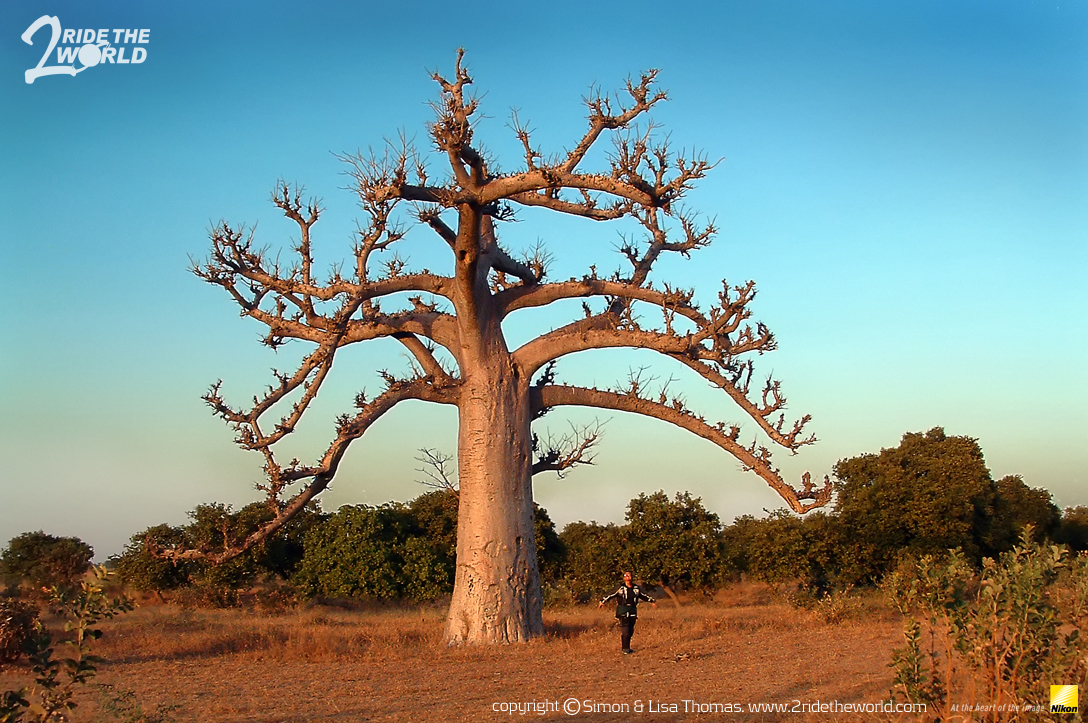
In the dim morning light, a glance down at my watch confirms it’s 6:30 am, we broke camp and left Dakhla (Morocco’s southern most town) an hour ago. I ease my grip on the handlebars and take in a deep breath. The wind drying my face does little to relieve the anxiety I feel as we ride south to the notorious Mauritanian border. Lisa is tucked in behind me, her single cylinder thumping a steady rhythm.
We travel South on the margin of civilization, deep within the disputed territories of the Western Sahara, a vast uninhabited and inhospitable stretch of barren desert, long fought over, with Morocco and Mauritania laying hostile claim. To our left the Sahara silently reaches out, shifting sand lit by the fast rising sun. It is 9:00am and already 100 degrees.
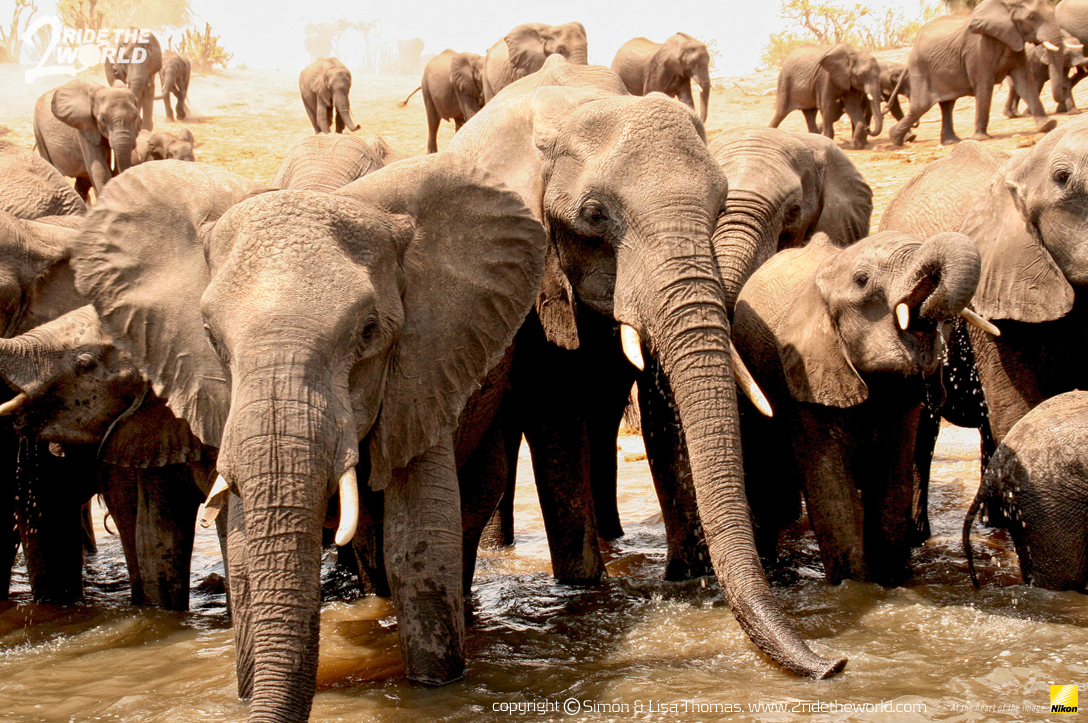
Treacherous Sands
We are, however, among new friends. After a chance meeting with them in Dakhla, Lisa and I ride ahead, followed closely by José, from France in his short wheel-based 4×4, with David and Katja in their Land Rover pickup, taking the rear. We will act as scouts, defining the route that best avoids the worst of the sand and relaying the information via our radio systems, and they will carry our heavy bags in the Land Rovers.
Dry mouthed and on tenterhooks, we pull up and stop a few feet past the first check point, we sip on thick sweet coffee served form the back of David’s 4×4. As we check through our returned papers, each of us retells the horror stories we know of doomed attempts to reach Nouakchott, Mauritania’s capital. José mentions three Frenchmen, who, upon crossing into Mauritania, turned off the trail and were blown up in minutes. David then darkens the gloom with stories of sun madness, death by dehydration and poor souls forced to drink radiator fluid to survive. Whether it’s a tale of sudden or agonizing demise, the theme is the same, and none of us feel the better for having broached the subject.
The bloody war between Morocco and Mauritania is long over but a terrifying legacy remains scattered ahead: thousands of pressure-sensitive mines still hidden in the loose sand. And the few wanting to pass this way have been on theirown for the past two years, ever since the discontinuation of the twice-weekly military convoys from Dakhla to the Mauritanian border. The safety of Mauritania bound travelers is no longer a responsibility Morocco wants.
At the second checkpoint gentle application of the rear brake on the loose sand, brings our bikes to a sliding stop. We are deep within “no man’s land.” A cheerless guard in a low stone building checks our documents while rats the size of cats scurry behind him, occasionally pausing to dine from the wooden bowl on the floor that the guard had eaten from just moments earlier. He asks us for a cadeux, a gift, and seems overwhelmed when we hand him a small bottle of eyewash. What for us is a simple saline solution for him is a miracle potion. (this sentence is important and illustrates the harsh difference in situation, quality of life, education and so on, I would like to include it).
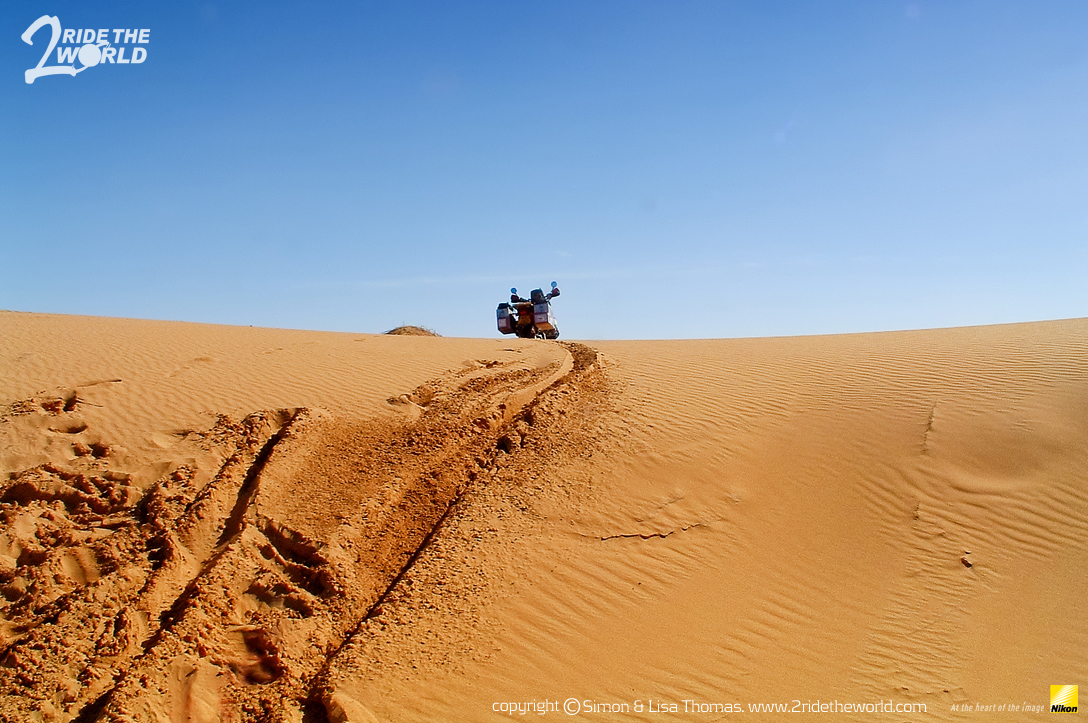
With our papers stamped we are underway again, though night will soon be upon us. Every alarm bell in my head is ringing. Ahead of us: 45 miles of minefield. Our only guide, a narrow electronic ‘breadcrumb’ trail on the GPS screen. Nerves and riding the soft sand in the dark are getting the better of us. The 4×4’s over took us a while back and now regular, our falls are increasing, and with each one the distance between us and our companions grows. Hard on the throttles of our bikes our wheels spin furiously, digging deeply into the soft furrowed sand. Up ahead, the dim lights of the 4×4’s fade as we fall further behind. I pull alongside Lisa, and after some discussion, resolve to stay put until daylight arrives or our friends return. We dare not get off the bikes or move a step to the side for fear of the mines; the fear is growing and growing. Cutting through the darkness, David’s flashlight strikes Lisa’s bike, and we’re relieved beyond measure to have been found. Taking our new position between the Land Rovers, we ride deeper into the minefield. Falls come and go, and at 10:00pm we clear the last few feet of mined terrain and can see the distant blush of town lights through our dusty goggles.
A chaos of shanties, air thick with dust, and narrow dirt roads teeming with clapped-out cars signal our arrival in Nouadhibou. We have been in the desert less than two days, but the small town is intimidating after the solitude and silence of the Sahara. Inside the refuge of the Auberge Chinguetti we violently gulp down mouthfuls of water from thin plastic bottles, spilling as much as we drink. Our bodies are spent—this is beyond adventure, verging on madness. Still dressed in our dusty riding suits, we haul our heavy bodies onto the filthy bunk beds and are asleep within seconds.
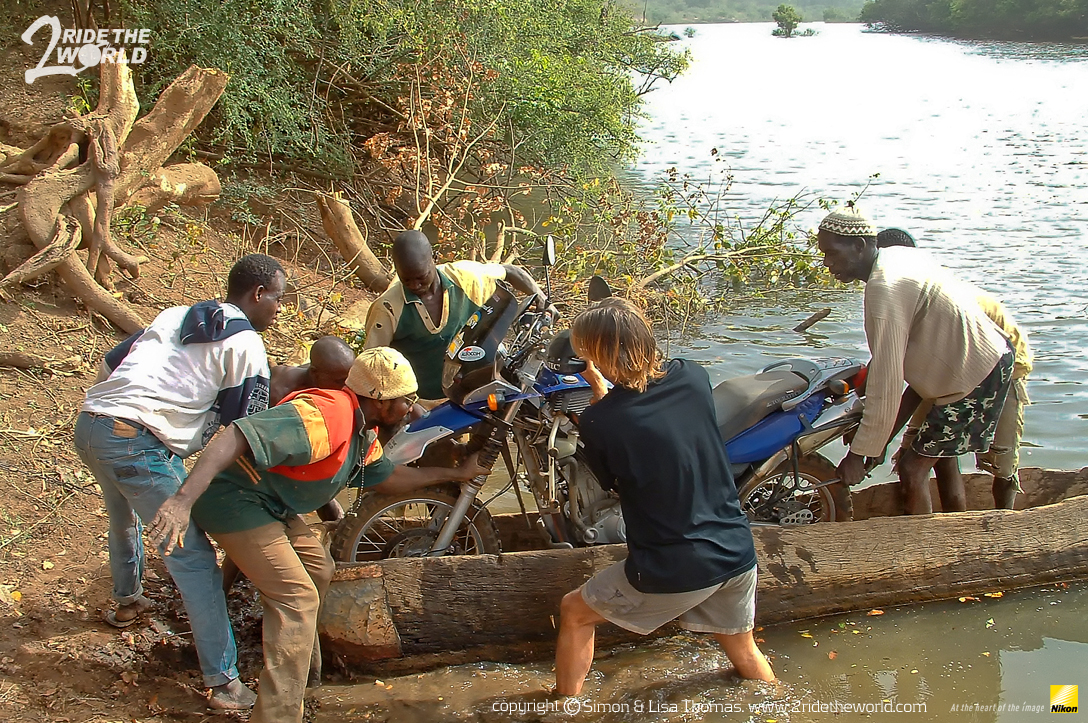
The route to Nouakchott is much more difficult than the journey to Nouadhibou. The sea of sand has towering dunes so immense skirting them is impossible. An overwhelming landscape, without markers, trails, fuel or help. Heading south, the bikes are sliding in the deep soft sand as we crest the top of the Leurier Bay. A few hundred feet to our right we can see our 4 wheeled companions make their own way. We are speeding across the Sebkha Aoueïtal, a wide stretch of salty sand flats. Up on the pegs, I snatch a glance at the speedo, the needle at 65mph and rising. The front wheel of my 1100GS no longer ploughing the sand is instead skimming the surface. The adrenalin fuelled exhilaration is almost overwhelming, and a far cry from our slow nervous ride through the minefield. We quickly relay the warning of ‘super’ soft sand ahead, through our radios and back to José, David and Katja, watching them sweep even wider to avoid the danger of getting stuck.
Our limbs are heavy and cramped from the massive effort of being up on the pegs for 12 hours at a time. These past four days south from Nouakchott have been the toughest riding either of us has ever tackled. Inside our tent we are sheltered from the cold desert wind, and we look out into the night, feeling the dizzying solitude of the Sahara.
The Sahara has stripped us of ego, of what we ‘imagined’ adventure to be and the ideas of who we thought we were. Exhausted and dirty, we are all the richer for the experience and also a little sad that all too soon we’ll be past this part of our journey. But right now, I’m happy to lose myself in this land without echo. Tomorrow we’ll race the tide the last 114 miles along the desolate beach south, to reach Nouakchott, and spend New Year’s Eve in the Mauritanian capital.
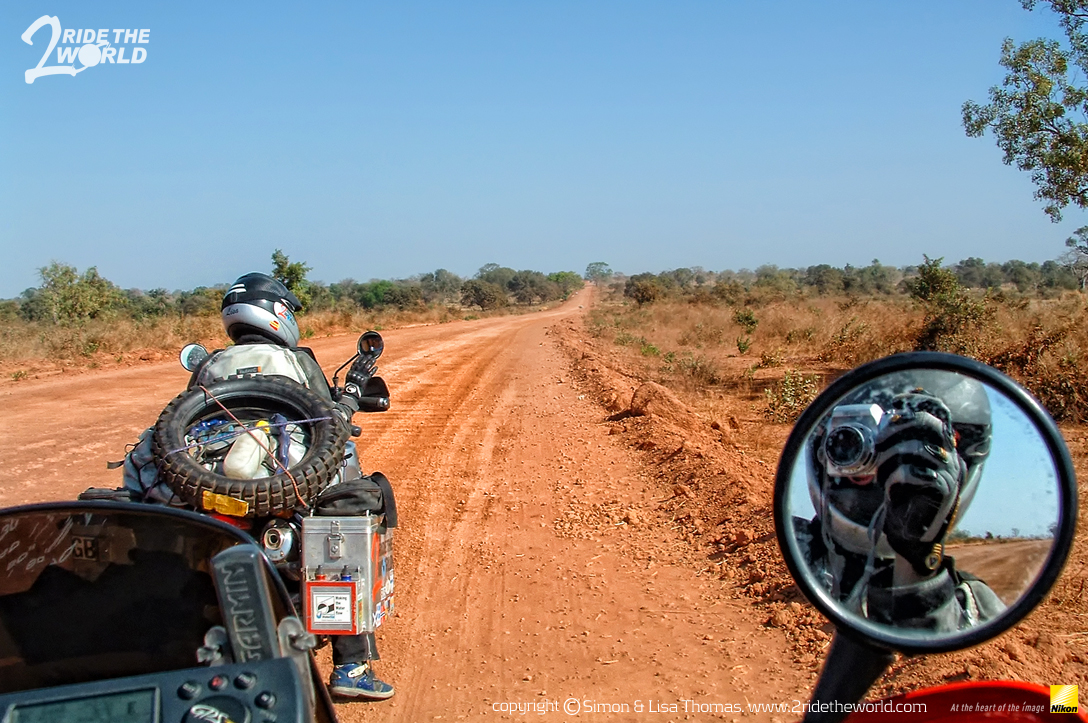
Senegal and Mali
After New Years Eve celebrations and a week of exploring Nouakchott, heartfelt hugs full of friendship and admiration mark a poignant moment, as we say farewell to our travelling companions. With the hazy bustle of Mauritania’s capital behind us, we look ahead to Africa’s West coast. It’s January, as we ride towards Senegal. The rest we enjoyed has done us good and the feeling of asphalt under my wheels feels strange but comforting after the grueling desert. The countryside is once again greening as we venture deeper into this sub-Saharan region.
Horror stories of theft and aggravation have put us off entering Senegal via ferry at the Rosso border. North of the chaotic port we turn right off the tar. We are making our way to a little know crossing North of St Louise. We find the start of the Diama Piste as we snake our way around the piles of rotting trash steaming in the sun, the sour stench catching in our nostrils. No asphalt here. Recent bursts of rain and a stream of laden vehicles have churned the piste; and those deep channels, hardened to cement in the scorching heat, snatch at our wheels and jerk the handlebars violently. The track requires all our concentration.
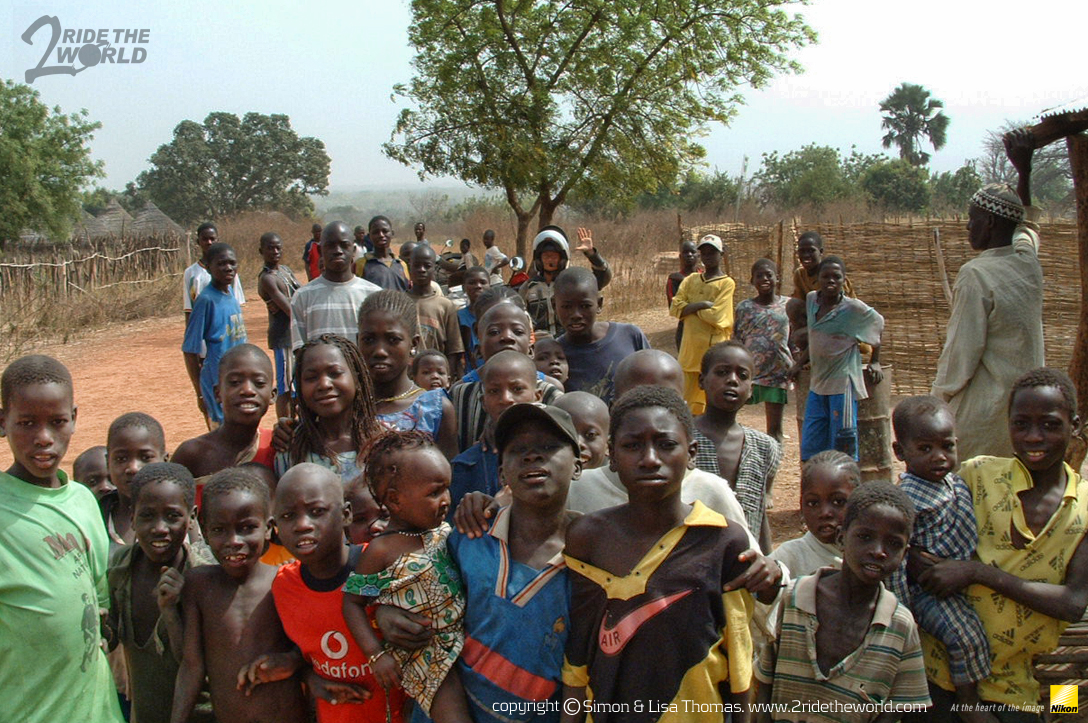
Quite suddenly an explosion out of the undergrowth to my left grabs my attention as five large, grunting warthogs burst onto the scene, heading straight for my front tire. Startled by the roar of our passing, they all dart left, now running parallel to the bikes and just a few inches away from my feet. As I pull away, they dive back into the vegetation.
Inside the brightly painted passport hut, a fat guard flicks through our paperwork, his round cherubim face a picture of lethargy and boredom. Thirty minutes go by and only the painfully slow movement of his pen convinces me he’s actually still conscious. He lifts several small wooden stamps, casually inspects the bottom of each, and with the correct stamp chosen, he slowly rocks it back and forth in the dried-up ink pad, as if lulling it to sleep. In teh broiling heat, I’m contemplating reaching down, grabbing his hand and planting the stamp myself; but finally he manages the effort unassisted and we can legally enter Senegal, our 22nd country.
Grey arched girders pass overhead as we cross the bridge to St. Louise, which is perched on a sliver of land in the mouth of the Senegal River. The capital of Senegal and Mauritania until 1958, it was the first French settlement of l’Afrique-Occidentale, and named after the French king. Once a thriving port notorious for its trade in slaves, St Louise now exudes an air of relaxed resignation. Paint peels off the walls of the small shanty cafes. Men swathed in richly colored folds of fabric slowly draw on thin cigarettes and the smoke curls gently in the air.
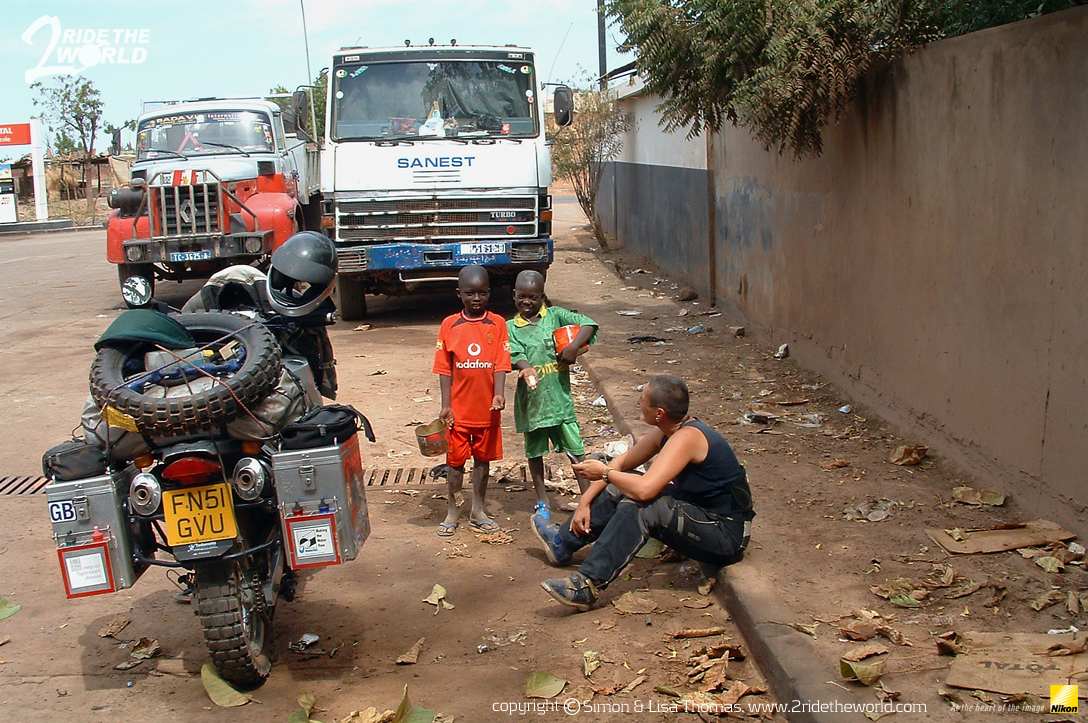
It’s the first of February, and the heat is soaring as we ride a dusty trail through dense scrubland to the border of Mali, one of the world’s poorest countries. A former French colony, Mali gained independence in 1960 but has since suffered rebellions, two coups and a 23-year military dictatorship. Life here is tough and its price cheap.
Strong dusty Harmattan winds push at us from the east. From the small town of Kedougu, we follow a narrow stony cattle track to a remote village where we set up camp before entering Mali. We ask Djibo, the chief of the village for his permission to sleep under his protection for the night. He grants his permission and in doing so he draws a circle in the dry dirt with his staff, encircling our hastily erected tent, and decrees that no one may enter. We are grateful for his gesture because the idea of “personal space” is an alien concept here. The setting sun is diffused by the dusty haze as we sit around the small crackling fire of tinder dry acacia twigs. Djibo’s strong features are accented by the flickering light. Then leaning forward, gently explaining himself with gesturing hands, he astonishes us when we realize he is saying, “We have never seen a white person.”
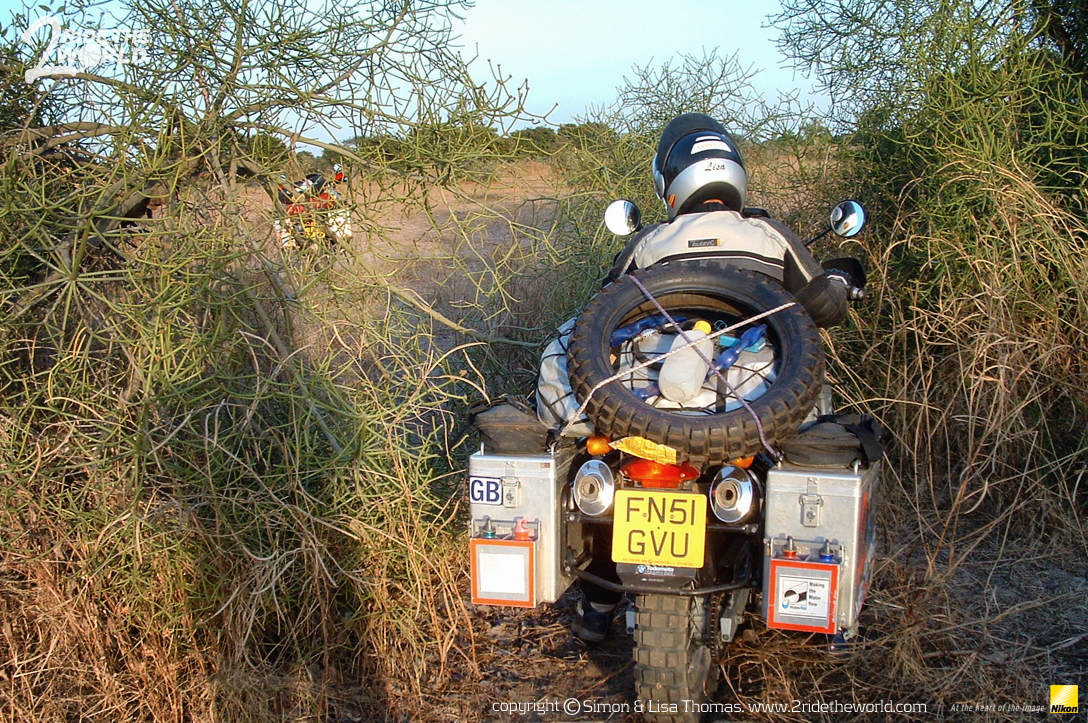
Across the Faleme River
Yesterday’s stony track has vanished, and we are relying on the GPS. Making our own way, we ride roughshod over the coarse grass, slowly picking our way through boulder-strewn thickets of sharp scrub. Branches snatch at the handlebars and snag our jackets. Our sluggish pace, the lack of moving air, also means we are feeling the full effect of the blistering heat of the day. A small sandy trail winds its way through a maze of contorted trees, leading us up and over the small rise ahead. We jam on the brakes and slide to a stop, our hearts in our mouths as we gaze out and across the wide glistening waters of the Faleme River. From our small plateau the river stretches into the distance without a crossing or bridge in sight. Down below two ancient dugouts, little more than hollowed-out tree trunks, bob in the water. Ten minutes later and we are deep into negotiations with Moussa, the dugouts’ owner, bargaining for a trade to set us ashore on the other bank. He does his frenetic best to assure us of his craft’s security. And though less than convinced, with no other option in sight, we have to chance it.
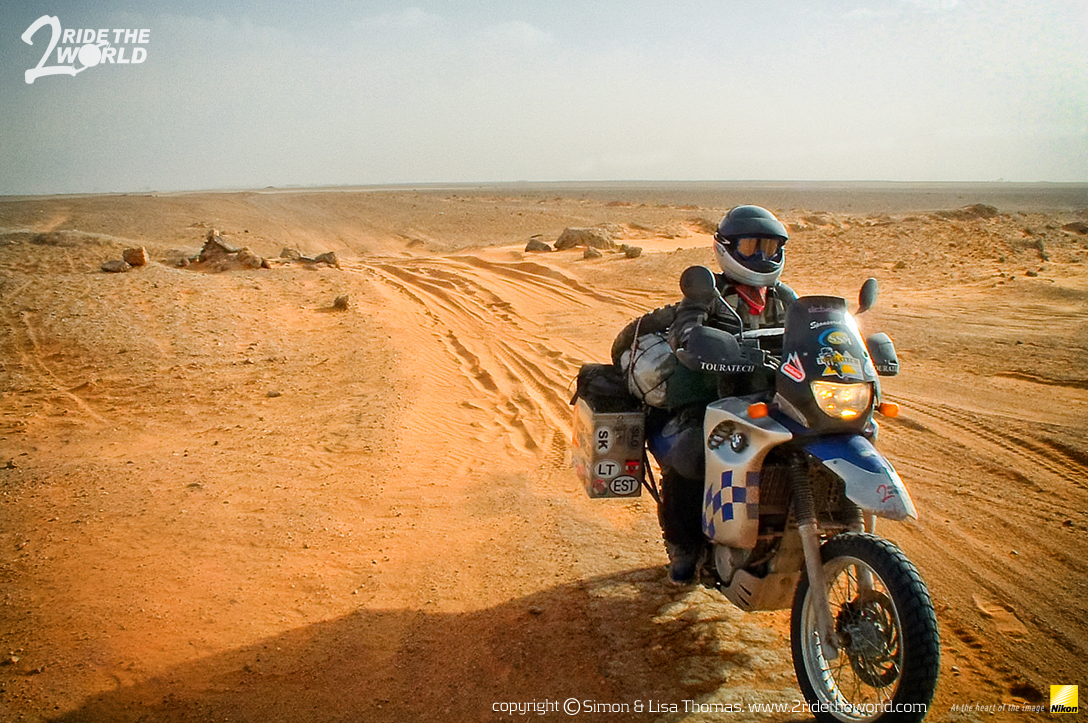
We agree upon a price and carefully walk the bikes down the steep, washed-out gulley to the river’s edge. Enlisting the help of five local men, we hoist the 1100GS into the ancient vessel. The dugout instantly concedes four inches to the water. The risk seems insane. And I hold my breath watching Moussa’s slow progress, as he takes one precarious stroke at a time, shifting and adjusting his body like a tightrope walker to compensate for the weight. But soon enough, the triumphant hoots echoing from the far shore allow me to relax a bit before he returns for Lisa’s bike.
Safely on the other side, we reassemble the bikes, load the kit and connect the fuel lines. The entire endeavour has taken us two and a half hours and cost us 10,000 CFA ($21), a few cigarettes, a half-used tube of crazy glue and a key fob. Lisa and I are ecstatic to have made it over, but now it is approaching midday, with a long ride ahead, and we are desperately tired from the tense crossing.
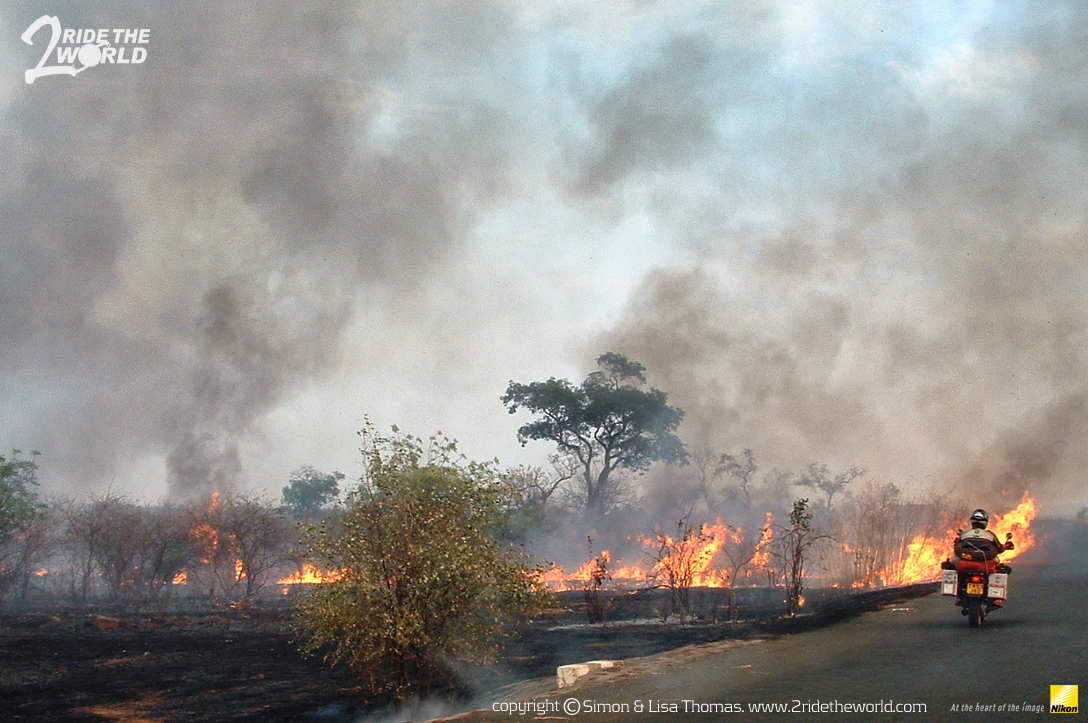
The air is thick with dust, and a brief stretch of flat land through scorched savannah is behind us—our trail having turned from deeply grooved hard-pack to a tortuous winding rocky path. The route is barely visible but for a faint meandering line of wear on the terrain. Sharp volcanic surfaces tackled in the afternoon require all our concentration because a fall could easily puncture a fuel tank. The physical exertion of hours upon hours of slow manoeuvring is draining us. Our once black jackets, are now crispy and white, the arms and chests rimed stiff from sweat. There are no signs of life, no villages, no cattle, no lone herdsmen on the horizon, even the vultures don’t venture here. The riding has been harder than we’d imagined and our precious water has been drunk and both of us are now suffering cramps from dehydration and bouts of hallucination. Without water for two days we’ve resorted to drinking the salty brine from the cans of vegetables in our store. Pitching our tent is also a concern as we’ve been skirting unchecked bushfires for most of the afternoon. Tonight we’ll sleep under the stars, but with one eye open.
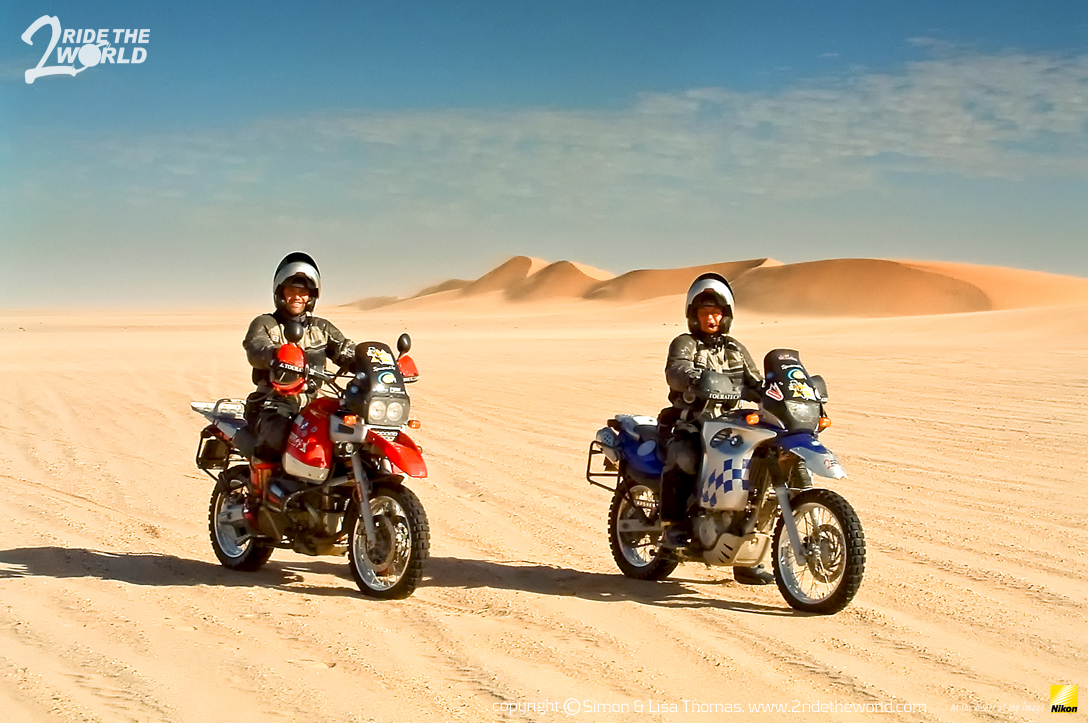
Sweet Water and Elephants
The excited shouts of children signal we’re on the outskirts of a small community, and within seconds we are surrounded by the rest of the villagers. It’s clear we are in need of water and our new friends lead us from the bikes. Twenty pairs of hands point to a small mud-bricked enclosure, their prized resource, a hand-pump well. Since our journey’s inception we’ve been raising funds for WaterAID, an international charity committed to providing water to the poorest regions of the world. But never did we imagine their work would touch our lives so directly or profoundly. Barely visible letters scrawled by finger into the dried mud around the well simply read, “This well was installed by WaterAID in 1992.”
With each tilt of the handle we draw up water from deep within the earth. Suddenly it erupts from the neck, falling heavily into our open mouths and spilling down our fronts—luxury, ecstasy and relief all rolled into one single moment. Thirty Five miles north of the well we reach the village of Bafoulabe. We’ve ridden 102-miles since entering Mali via the river and it has taken us almost 5-days. We’ve feel as though we’ve been to hell and back.
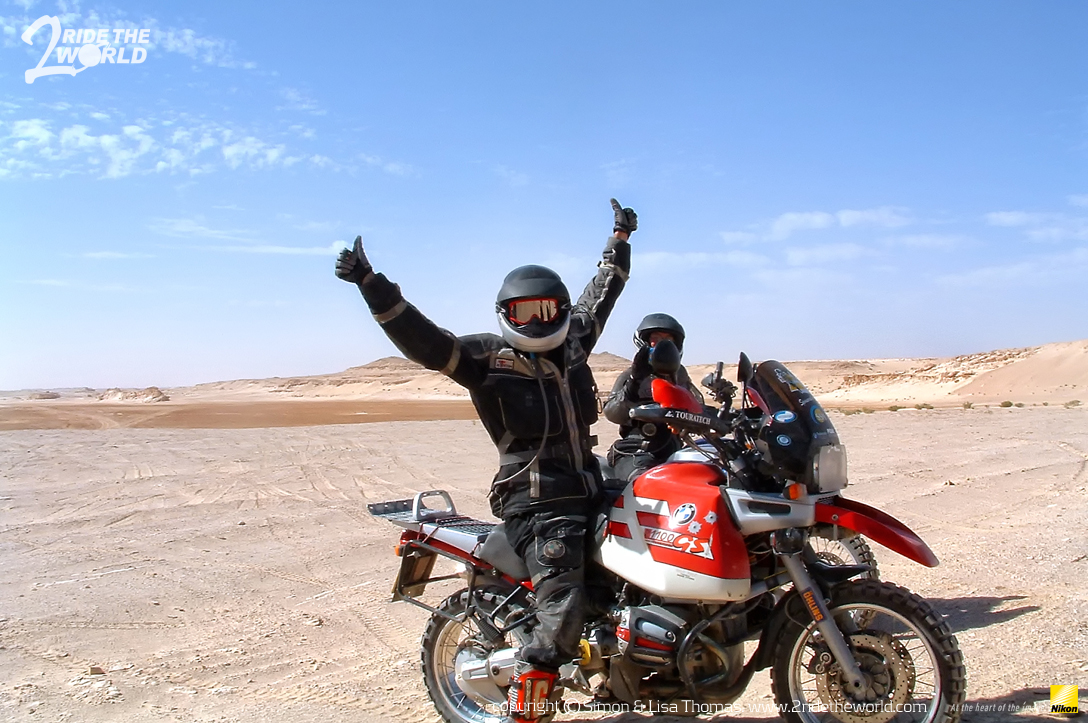
After exploring Burkina Faso on good tar and without any problems, we reach Ghana and relax in relative ease at Mole National Park. In the early morning, sitting outside our tent, we can almost feel Africa’s pulse, our gazes fixed on the scene. Staring in disbelief and wonder, spellbound, we watch 40 wild elephants bathe and graze just 50 feet below us for two hours, their sweeping trunks spray high, arcing jets of water as the calves roll and frolic in a muddy pool on the otherwise open and sere savannah. Our earlier hardships easily fade away, made all the more worthwhile for this single privileged and magical moment. Our journey into Africa’s heart has truly begun.
Stay tuned for more stories from Simon and Lisa’s motorcycle journey around the world!
Click HERE to learn more about 2RideTheWorld.
